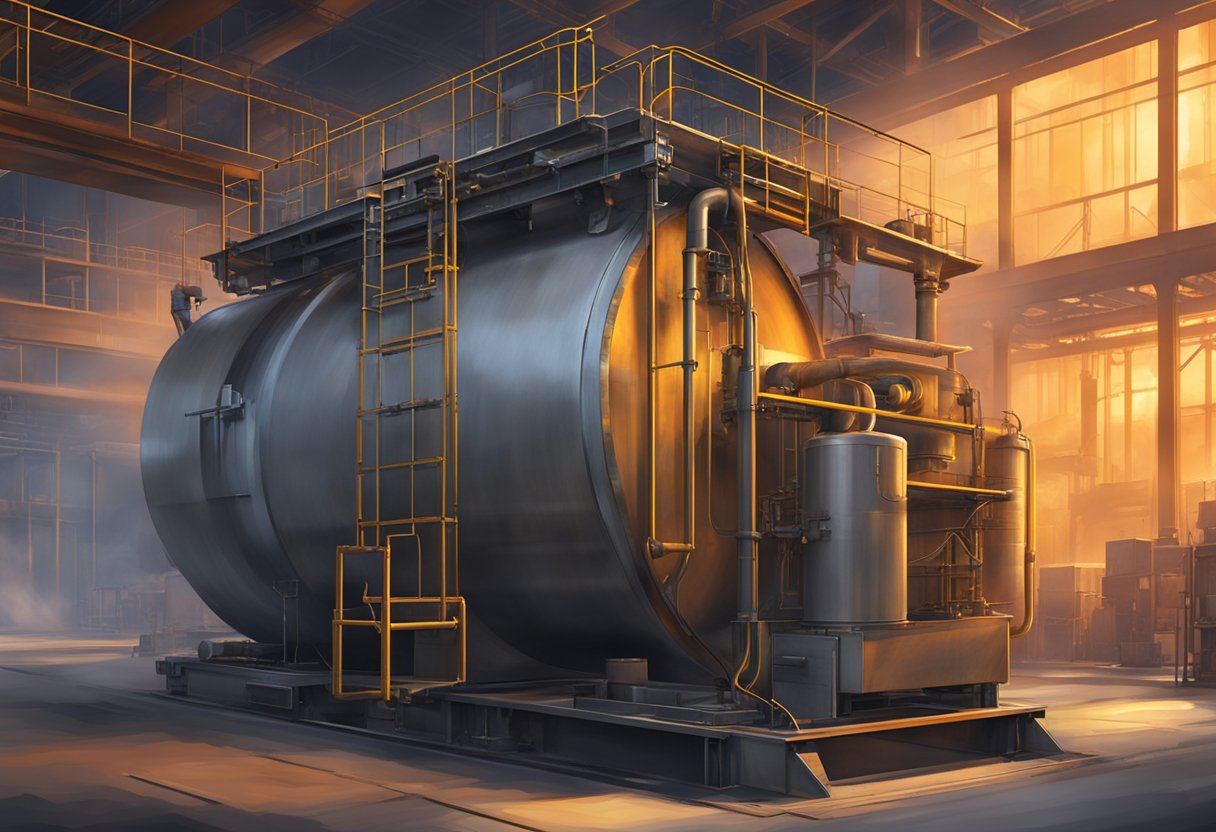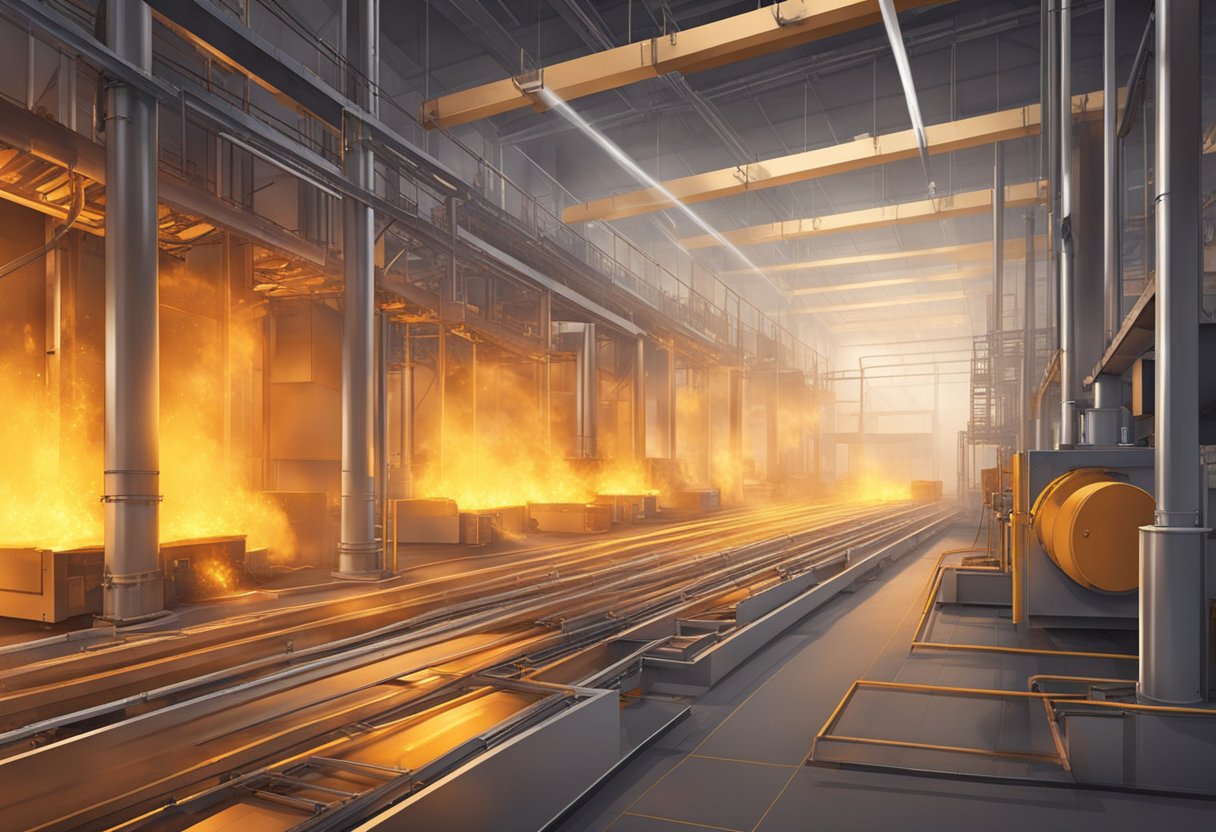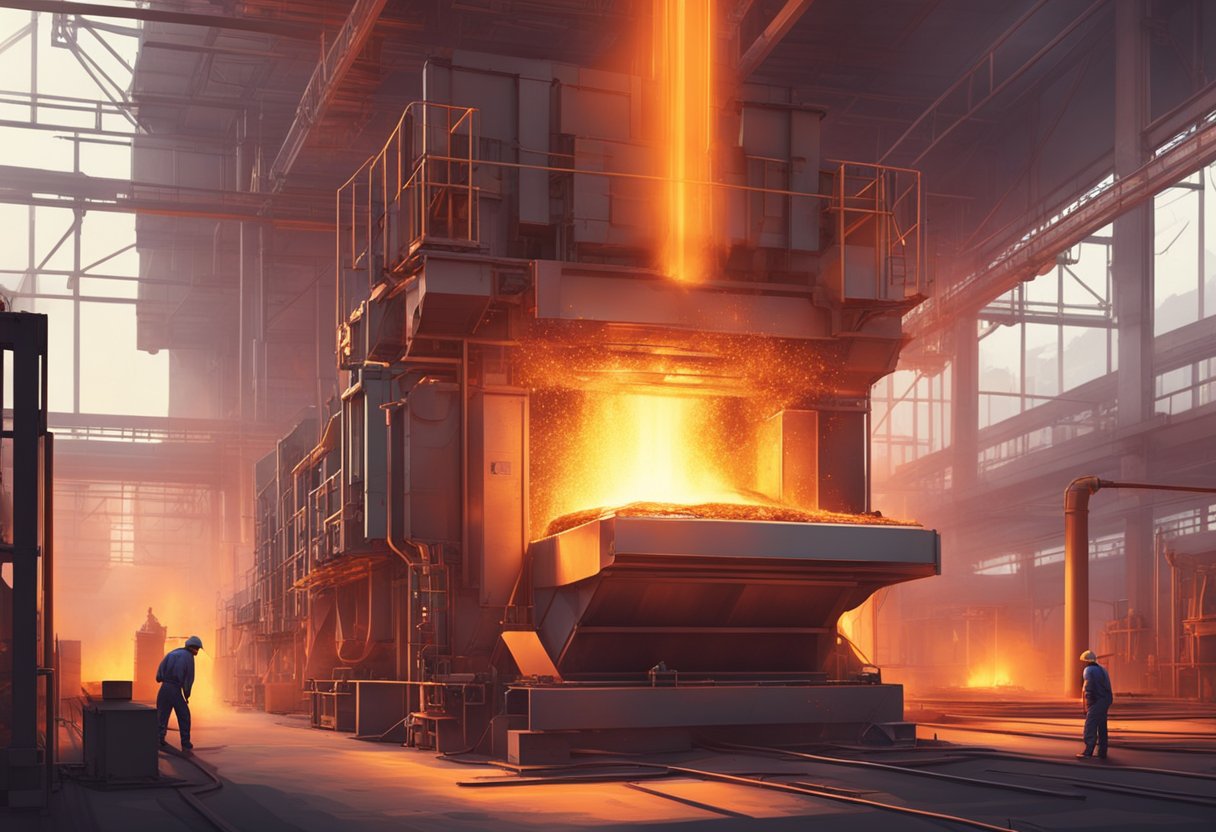Custom Annealing Oven: A Comprehensive Guide to Design and Features
Custom annealing oven plays a pivotal role in various industries that require precise heat treatment processes to enhance the properties of metals, semiconductors, and other materials. These specialized ovens are designed to meet the unique requirements and challenges of specific applications, ensuring optimal temperature control, material compatibility, process optimization, and quality assurance.

At Industrialfurnaces, we understand the importance of custom annealing ovens and their role in the manufacturing process. We offer a wide range of custom annealing ovens that are designed to meet the unique needs of our customers. Our team of experts works closely with our clients to understand their requirements and develop a custom solution that meets their needs. From small-scale annealing ovens to large-scale industrial ovens, we have the expertise and experience to deliver high-quality solutions that meet our clients’ needs.
Overview of Custom Annealing Ovens

At Industrialfurnaces, we specialize in designing and manufacturing custom annealing ovens for various industrial applications. Annealing is a heat treatment process that involves heating a material to a specific temperature and then cooling it slowly to alter its physical and chemical properties. Our custom annealing ovens are designed to meet the unique requirements and challenges of specific applications, ensuring optimal temperature control, material compatibility, process optimization, and quality assurance.
Our custom annealing ovens are built to the highest standards of quality and performance. We use the latest technologies and materials to ensure that our ovens are durable, reliable, and efficient. Our ovens are designed to provide precise temperature control, uniform heating, and consistent results. We offer a wide range of custom options, including chamber size, heating method, cooling method, atmosphere control, and automation.
Our custom annealing ovens are used in a variety of industries, including aerospace, automotive, electronics, medical, and more. We work closely with our clients to understand their specific needs and requirements and develop a custom solution that meets their needs. We provide comprehensive support throughout the entire process, from initial design to installation and training.
In summary, our custom annealing ovens are designed to provide precise and consistent results for a wide range of industrial applications. We are committed to providing the highest level of quality, performance, and customer service to our clients. Contact us today to learn more about our custom annealing ovens and how we can help you achieve your goals.
Design Considerations

When it comes to designing a custom annealing oven, there are several important factors to consider. These considerations include temperature uniformity, size and capacity, and control systems.
Temperature Uniformity
Temperature uniformity is a critical factor in the design of an annealing oven. Our custom annealing ovens are designed to ensure that the temperature is consistent throughout the oven. This is achieved through the use of specialized heating elements and a carefully designed airflow system. We also use advanced temperature control systems to ensure that the temperature is maintained within a tight tolerance range.
Size and Capacity
The size and capacity of an annealing oven is another important consideration. Our custom annealing ovens are designed to meet the specific needs of our clients. We can design ovens in a range of sizes and capacities to accommodate different materials and production volumes. We can also design ovens with multiple chambers to allow for different annealing processes to be performed simultaneously.
Control Systems
Control systems are an essential part of any annealing oven. Our custom annealing ovens are equipped with advanced control systems that allow for precise temperature and time control. We can design control systems that are fully automated or that allow for manual control, depending on the needs of our clients. Our control systems are also designed to be easy to use and to provide real-time monitoring of the annealing process.
In summary, when designing a custom annealing oven, it is important to consider factors such as temperature uniformity, size and capacity, and control systems. At our company, we have the expertise and experience to design and build custom annealing ovens that meet the specific needs of our clients.
Construction Materials

When it comes to custom annealing ovens, choosing the right construction materials is crucial to ensure optimal performance and longevity. At Industrialfurnaces, we use high-quality materials to construct our ovens and ensure they meet the specific needs of our clients.
Insulation Types
Insulation is an important component of any annealing oven, as it helps to maintain a consistent temperature and prevent heat loss. We offer a variety of insulation types to meet the unique needs of our clients, including:
- Ceramic Fiber Insulation: This type of insulation is made from ceramic fibers and is known for its excellent thermal insulation properties. It is lightweight, durable, and can withstand high temperatures.
- Mineral Wool Insulation: Mineral wool insulation is made from natural or synthetic materials and is known for its excellent thermal and acoustic insulation properties. It is also fire-resistant and can withstand high temperatures.
- Refractory Insulation: Refractory insulation is made from materials such as fire clay, alumina, and silica and is known for its excellent thermal shock resistance. It is ideal for applications that involve rapid temperature changes.
Heating Elements
The heating elements are another important component of an annealing oven, as they are responsible for heating the oven to the desired temperature. We offer a variety of heating elements to meet the specific needs of our clients, including:
- Resistance Heating Elements: These heating elements are made from materials such as nichrome or kanthal and are known for their high resistance to electrical current. They are ideal for applications that require high temperatures and precise temperature control.
- Infrared Heating Elements: Infrared heating elements use radiant heat to transfer energy to the material being annealed. They are ideal for applications that require rapid heating and cooling.
- Gas-Fired Heating Elements: Gas-fired heating elements use natural gas or propane to heat the oven. They are ideal for applications that require high temperatures and rapid heating.
At Industrialfurnaces, we work closely with our clients to determine the best insulation and heating elements for their specific needs. Contact us today to learn more about our custom annealing ovens and how we can help you meet your annealing needs.
Operating Principles
At our company, we design and manufacture custom annealing ovens that are tailored to your specific needs. In this section, we will discuss the operating principles of our annealing ovens.
Heating Methods
Our annealing ovens use a variety of heating methods, including electric, gas, and infrared. Electric heating is the most common method and is ideal for low-temperature applications. Gas heating is more suitable for high-temperature applications, while infrared heating is used for rapid heating and cooling.
Our ovens also use a variety of heating elements, including resistance wire, ceramic, and quartz. Resistance wire is the most common heating element and is used for temperatures up to 1200°C. Ceramic heating elements are used for temperatures up to 1600°C, while quartz heating elements are used for temperatures up to 2000°C.
Cooling Techniques
Our annealing ovens use a variety of cooling techniques, including natural cooling, forced air cooling, and water cooling. Natural cooling is the simplest and most cost-effective method, but it is also the slowest. Forced air cooling is faster and more efficient, but it requires a blower or fan. Water cooling is the fastest and most efficient method, but it requires a water source and a heat exchanger.
Our ovens also use a variety of cooling media, including air, water, and oil. Air cooling is the most common method and is used for low-temperature applications. Water cooling is used for high-temperature applications, while oil cooling is used for very high-temperature applications.
In summary, our custom annealing ovens use a variety of heating methods and cooling techniques to provide precise and efficient heat treatment for your materials. We can tailor our ovens to your specific needs and provide you with the best solution for your application.
Safety Features
At our custom annealing ovens, safety is our top priority. We understand the importance of keeping your employees and equipment safe while using our products. That’s why we’ve implemented several safety features in our custom annealing ovens.
Overheat Protection
Our custom annealing ovens are equipped with overheat protection to prevent damage to the equipment and ensure the safety of your employees. The overheat protection system is designed to shut down the oven when it reaches a certain temperature, preventing it from overheating and causing a fire. This feature not only protects your equipment but also ensures the safety of your employees by preventing accidents.
Door Lock Mechanism
The door lock mechanism is another safety feature that we’ve implemented in our custom annealing ovens. The door lock mechanism ensures that the oven door is securely locked during operation, preventing any accidental opening of the door. This feature not only protects your employees but also ensures that the annealing process is not interrupted, resulting in a high-quality product.
In addition to these safety features, we also offer custom safety features based on your specific requirements. We work closely with our customers to understand their safety needs and provide custom solutions to ensure the safety of their employees and equipment.
At Ceramicx, we take safety seriously. Our custom annealing ovens are designed with safety in mind, so you can rest assured that your employees and equipment are in good hands.
Maintenance and Troubleshooting
At Wisconsin Oven, we believe that regular maintenance is critical to the longevity and efficiency of your custom annealing oven. Routine maintenance can prevent costly repairs and downtime, as well as ensure that your oven is operating at peak performance.
Routine Maintenance
Regular maintenance of your custom annealing oven should include cleaning, inspection, and calibration. Cleaning should be done regularly to remove any debris or buildup that can affect the performance of the oven. Inspection should be done to ensure that all components are functioning properly and that there are no signs of wear or damage. Calibration should be done to ensure that the oven is operating at the correct temperature and that there are no deviations from the setpoint.
Common Issues and Solutions
Even with regular maintenance, issues can arise with your custom annealing oven. Some common issues include uneven heating, temperature fluctuations, and power outages.
One of the most common issues is uneven heating, which can result in inconsistent annealing. This can be caused by a number of factors, including incorrect airflow, damaged heating elements, or a malfunctioning temperature controller. To address this issue, we recommend checking the airflow and inspecting the heating elements for damage. If the issue persists, it may be necessary to replace the temperature controller.
Another common issue is temperature fluctuations, which can also result in inconsistent annealing. This can be caused by a number of factors, including a malfunctioning temperature controller, a faulty thermocouple, or a damaged heating element. To address this issue, we recommend checking the temperature controller and thermocouple for accuracy and inspecting the heating elements for damage. If the issue persists, it may be necessary to replace the temperature controller or thermocouple.
Power outages can also be a common issue with custom annealing ovens. This can be caused by a number of factors, including power surges, electrical faults, or weather-related events. To prevent damage to the oven and ensure safety, it is important to have a backup power source and a plan in place for power outages.
In conclusion, regular maintenance and troubleshooting are critical to the longevity and efficiency of your custom annealing oven. By following these guidelines, you can prevent costly repairs and downtime, as well as ensure that your oven is operating at peak performance.
Applications of Annealing Ovens
Annealing ovens are used in various industries to alter the physical properties of materials as part of the manufacturing process. The annealing process is commonly used for the improvement of machinability, improvement of mechanical or electrical properties, increase in stability of dimensions, improved ductility, relieve stress, assist in refining grain size, and more.
Metallurgical Processes
In metallurgical processes, annealing ovens are used to soften metal and improve its ductility. The process involves heating the metal to a specific temperature and then cooling it slowly. This process helps to remove internal stresses and improve the metal’s mechanical properties. Annealing ovens are suitable for treating a wide range of metals, including steel, aluminum, copper, and brass.
Glasswork and Ceramics
Annealing ovens are also commonly used in the glasswork and ceramics industry. Glass and ceramics are brittle materials that can easily crack or break when subjected to stress. Annealing ovens help to remove internal stresses from the material, making it stronger and more durable. Annealing ovens can operate under an inert atmosphere or normal oxygen atmosphere depending on your requirement.
In conclusion, annealing ovens are versatile tools that are used to improve the properties of various materials. They are widely used in the metallurgical, glasswork, and ceramics industry. If you are looking for a custom annealing oven, contact us today to learn more about our high-quality, custom-built annealing ovens.
Customization Process
At Industrialfurnaces, we understand that every industrial heat treatment process is unique and requires a tailored solution. That’s why our custom annealing ovens are designed to meet the specific requirements and challenges of each application. Our customization process is divided into two main stages: Consultation and Design, and Installation and Commissioning.
Consultation and Design
During the Consultation and Design stage, we work closely with our clients to identify their needs and develop a customized solution that meets their specific requirements. Our team of experts will conduct a thorough analysis of the application, taking into consideration factors such as material compatibility, process optimization, and quality assurance. We will also provide guidance and recommendations on the most suitable oven design, heating system, and control system for the application.
To ensure that our clients are satisfied with the proposed solution, we provide detailed 3D models and drawings of the custom annealing oven. Our clients will have the opportunity to review and provide feedback on the design before we proceed to the next stage.
Installation and Commissioning
Once the design has been approved, we proceed to the Installation and Commissioning stage. Our team of experienced engineers will install the custom annealing oven at the client’s facility. We will also provide training on how to operate and maintain the oven, ensuring that our clients are able to maximize its performance and longevity.
During the commissioning process, we conduct a thorough inspection and testing of the oven to ensure that it meets the required specifications and performance standards. We also provide ongoing support and maintenance services to ensure that the oven continues to operate at peak performance.
At Industrialfurnaces, we are committed to providing our clients with high-quality, customized solutions that meet their unique needs. Contact us today to learn more about our custom annealing ovens and how we can help optimize your industrial heat treatment process.
Frequently Asked Questions
What are the key features to look for in a custom annealing oven for metal?
When selecting a custom annealing oven for metal, it is important to consider the following features:
- Temperature control accuracy
- Uniformity of temperature distribution
- Heating and cooling rates
- Atmosphere control
- Size and capacity
- Energy efficiency
- Durability and reliability
How does the annealing process in an oven differ for glass versus plastics?
The annealing process for glass and plastics differs in terms of temperature and cooling rates. Glass requires a slower cooling rate than plastics to prevent cracking due to thermal shock. Plastics, on the other hand, require a faster cooling rate to prevent deformation due to residual stresses.
What are the temperature requirements for an effective annealing furnace?
The temperature requirements for an effective annealing furnace depend on the material being annealed. Metals typically require temperatures between 300°C and 1000°C, while glass and plastics require temperatures between 400°C and 600°C. The temperature should be maintained within a specific range to ensure consistent results.
What should be considered when selecting a manufacturer for a custom annealing oven?
When selecting a manufacturer for a custom annealing oven, it is important to consider their experience, reputation, and track record. Look for a manufacturer with a proven track record of producing high-quality, reliable ovens that meet your specific needs. Also, consider their customer service and support, as well as their ability to provide custom solutions.
How does an annealing oven improve the properties of materials?
Annealing is a heat treatment process that improves the properties of materials by relieving residual stresses, increasing ductility, improving machinability, and refining grain structure. The annealing process involves heating the material to a specific temperature and holding it there for a specific amount of time, followed by controlled cooling to room temperature.
What are the size considerations for a small annealing oven in a workshop setting?
When selecting a small annealing oven for a workshop setting, it is important to consider the size and capacity of the oven. The oven should be large enough to accommodate the size of the parts being annealed, but not so large that it is inefficient to operate. Additionally, the oven should be energy-efficient and easy to operate, with user-friendly controls and safety features.





